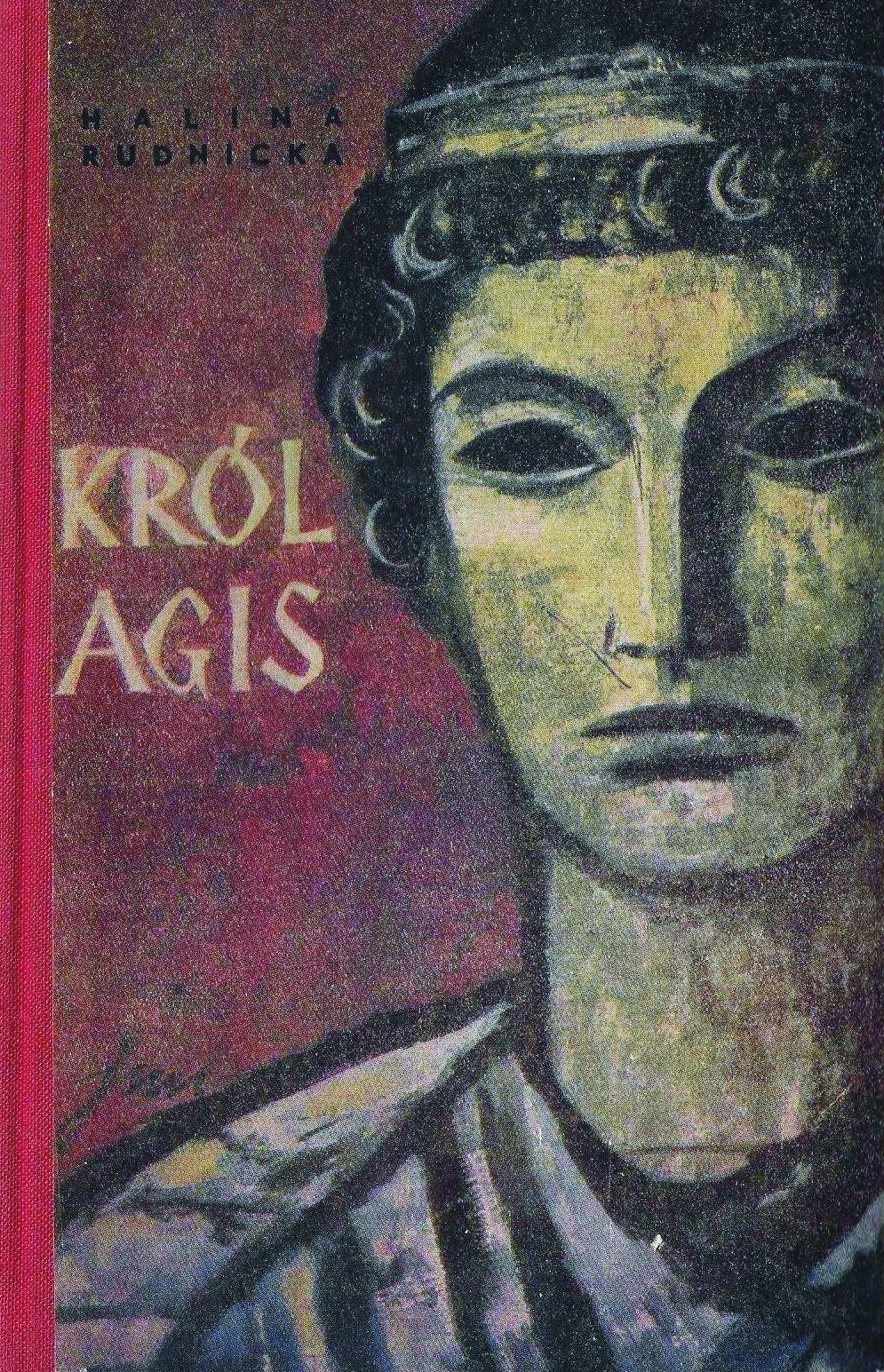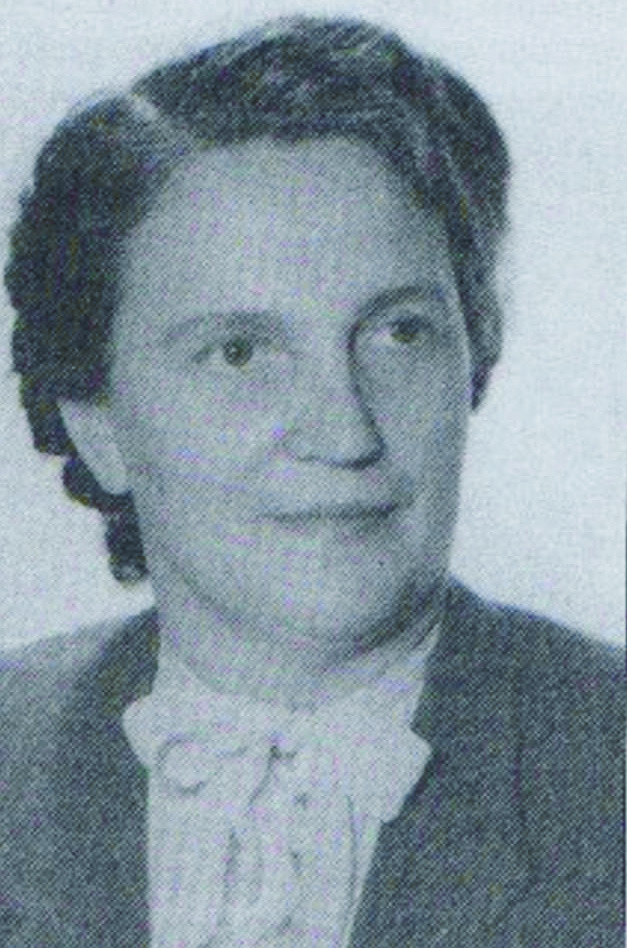Title of the work
Country of the First Edition
Country/countries of popularity
Original Language
First Edition Date
First Edition Details
Halina Rudnicka, Król Agis. Warszawa: Ludowa Spółdzielnia Wydawnicza, 1963, 456 pp.
ISBN
Genre
Historical fiction
Novels
Target Audience
Crossover (Children, teenagers, young adults)
Cover

Cover design and illustrations by Jan Marcin Szancer, Warsaw: Ludowa Spółdzielnia Wydawnicza, 1965 [ed. pr. 1963]. 528 pp. Courtesy of the publisher.
Author of the Entry:
Summary: Joanna Grzeszczuk, University of Warsaw, joannagrzeszczuk1@gmail.com
Analysis: Marta Pszczolińska, University of Warsaw, m.pszczolinska@al.uw.edu.pl
Peer-reviewer of the Entry:
Katarzyna Marciniak, University of Warsaw, kamar@al.uw.edu.pl
Elżbieta Olechowska, University of Warsaw, elzbieta.olechowska@gmail.com

Photograph from Janusz Dębski’s archive.
Halina Rudnicka
, 1909 - 1982
(Author)
Born in Mława. A writer, publicist, educator, and author of textbooks. Most known for writing books inspired by Antiquity and aimed at young adults. Graduated from the University of Warsaw with MA in Polish philology. She later completed a post graduate degree in pedagogy. During the German occupation she took part in the underground education of Polish children. After WW2 she worked at the Ministry of Education right up to 1949, and then devoted herself to writing full time.
The beginning of her literary career coincided with the 5th Congress of Polish Writers at which social realism was imposed as the leading literary style. As a result, most of her books display a strong influence of the social realism. Her major works: Polną ścieżką [Through Field Path], 1949; Chłopcy ze Starówki [Lads from the Old Town], 1960 – books referring to WW2 and Nazi German occupation of Poland; Płomień gorejący [Ardent Fire], 1951 – a biography of Felix Dzerzhinsky aimed at young adults, and Wspomnienia o Janku Krasickim [Memoirs about Janek Krasicki], 1955 — a story of the young Polish activist and agitator for USSR. Rudnicka is also the author of Trylogia spartańska [Spartan Trilogy] — a series of three novels for young adults: Król Agis [King Agis], 1963; Syn Heraklesa [The Son of Heracles], 1966, and Heros w okowach [A Hero Bound], 1969.
She was the recipient of many Polish and international awards, e.g. the Polish National Award (2nd Rank) for her novel Uczniowie Spartakusa [The Disciples of Spartacus], 1951, the Prime Minister’s Award for her books for children and teens. In 1979 her novel Uczniowie Spartakusa gained a place on the Hans Christian Andersen Honour List.
Sources:
Janusz Dębski, "Halina Rudnicka – pisarka z Mławy", kuriermlawski.pl (accessed: February 21, 2013).
Hanna Kanigowska, "Patron", zpo2.mlawa.pl (accessed: June 11, 2021).
"Rudnicka Halina", in Julian Krzyżanowski, ed., Literatura polska. Przewodnik encyklopedyczny, vol. II: N–Ż, Warszawa: Państwowe Wydawnictwo Naukowe, 1985, 318–319.
Bio prepared by Helena Płotek, University of Warsaw, helenaplotek@student.uw.edu.pl
Sequels, Prequels and Spin-offs
Halina Rudnicka, Syn Heraklesa, Warszawa: Ludowa Spółdzielnia Wydawnicza, 1966.
Halina Rudnicka, Heros w okowach, Warszawa: Ludowa Spółdzielnia Wydawnicza, 1969.
Summary
Based on: Katarzyna Marciniak, Elżbieta Olechowska, Joanna Kłos, Michał Kucharski (eds.), Polish Literature for Children & Young Adults Inspired by Classical Antiquity: A Catalogue (accessed: June 11, 2021), Faculty of “Artes Liberales”, Warsaw: University of Warsaw, 2013, 444 pp., section by Helena Płotek, Joanna Grzeszczuk and Michał Kucharski, pp. 311–323.
King Agis is the first book of Halina Rudnicka’a Spartan Trilogy. 3rd century B.C., Sparta. Young Agis succeeds his father Eudamidas as king of Sparta. He realizes that the Spartans largely abandoned ancient principles determined by Lycurgus, the creator of Sparta’s political system. Agis wants to restore the ancient discipline, but he is opposed by Leonidas, the second king and by the ephors who do not care about poorer classes of society. Fortunately, the young king with the help of his friends gets rid of Leonidas and wins his fight for a better Sparta. However, soon afterwards, he has to go for a war and during his absence his enemies bring back Leonidas. When Agis finds out what happened, he goes back to Sparta but arrives too late, is captured and sentenced to death for high treason. He is executed by one of his closest friends, Damochares who is in love with his wife, Agiatis. Agis’ beautiful dream of a great and powerful Sparta dies with him. The book is illustrated by a famous graphic artist Jan Marcin Szancer.
Analysis
The author based her novel on ancient sources, creating a reliable historical background and descriptions of the main characters – especially Plutarch’s The Parallel Lives. The Life of Agis is evident, due to direct quotations, and to the attitude towards the protagonist. It is necessary to remember that Plutarch’s Lives were written to illuminate and highlight moral virtues of chosen illustrious positive characters as desirable models and to show disgusting vices which characterized moral failures. Thus, Agis is presented as flawless, which Rudnicka also preserves.
Agis IV is first presented as a king’s son travelling to Athens to gain some wisdom, experience, refinement and “polish”, and then to Delphi to take part in horse races during the Pythian Games. At the same time, his father, Eudamidas II, seeks healing at Asclepius’ sacred center in Epidauros, and in Zeus’ sanctuary in Olympia. Although Eudamidas is shown as a modest, almost ascetic person, just and loving of peace, who always chooses difficult peace rather than victorious war, he considers his son's kindness and clemency as false qualities and worries because he thinks that a real king cannot be kind, but must rule justly and strictly. He punishes others personally when necessary, albeit without cruelty, for which he is viewed as a good ruler and loved by his people. Agis, as his successor, goes a step further and wants to reign without violence at all. Since his childhood, he has been a sensitive person, the fate of poorer homoioi, and perioikoi and even of helots concerns him much more than his own. He sees the social inequality and poverty that people experience. During his sea journey, he considers Plato’s view about philosopher-kings. In Athens, he finds a good home for an abandoned infant girl, ensures funds for her upbringing and future dowry; he also decides to save all Spartan children born with physical disabilities from death, by introducing a new law. In Delphi, he rescues a philosopher, a student of Zeno of Citium, from being lynched, and takes him to Sparta. When he enters his dead father’s chamber to study documents and historical items held in his archive, he thinks about Socrates as a role model of righteousness against lawlessness. According to a report from a trial after the naval battle of Arginusae – at that time, the only man brave enough to refuse to vote against innocents was Socrates. Having cancelled debts, restored Lycurgus’ institutions and regulations and introduced reforms to Sparta, the young king refuses repressions against political opponents. He even saves his worst foe, Leonidas, and orders him escorted safely to the state borders. When he loses popular support because of his uncle Agesilaus's abusive politics, he still has a chance to regain full power. Still, he does not consent to a coup d'état to avoid bloodshed. Until the end, he hopes for a peaceful agreement but dies as a result of treason following a parody of a trial. Even defeated and sentenced to death, Agis shows his greatness and moral superiority. Leonidas’ mercenaries refuse to execute the king; later, despite the orders they received, they let Agis’ wife, Agiatis, take the bodies of her husband, his mother and grandmother and perform a proper burial saving the dead from being desecrated. Throughout the novel, the idealistic character of Agis appears completely divorced from reality. He resembles not a person of flesh and blood but rather a Platonic ideal and a perfect form in contrast to the others’ “shadows”.
Though also described according to ancient sources, all other historical figures are presented with more probability as less unreal and distant.
What makes the described situations and characters credible and more authentic is the intricately polished background, including almost all aspects of life in the Greek world in difficult times of political decline and deterioration of life quality. Social issues are not the only element present in the novel. There is much cultural and historical background information, such as descriptions of places, institutions, rituals, games, customs, habits, common practices or philosophical views. The reader can learn about life and politics in the Spartan state and about Athens as seen by a young Spartan, and about Delphi including the Games and the Oracle, the sanctuary of Asclepius in Epidauros or Olympia “out of season”. It is a precious window on what went on behind the scenes of great politics, hidden conspiracies, and known actions of great figures: everyday life and average people with their beliefs, hopes and concerns.
Further Reading
"Agis IV", in: William Smith, ed., A Dictionary of Greek and Roman Biography and Mythology, Boston: Little, Brown and Company, 1867, 73, quod.lib.umich.edu (accessed: June 11, 2021).
De Pourcq, Maarten and Geert Roskam, “Mirroring virtues in Plutarch’s Lives of Agis, Cleomenes and the Gracchi” in K. De Temmerman and K. Demoen, eds., Writing Biography in Greece and Rome: Narrative Technique and Fictionalization, Cambridge: Cambridge University Press, 2016, 163–180.
Fuks, Alexander, "Agis, Cleomenes, and Equality", Classical Philology 57.3 (1962): 161–166 (accessed: June 11, 2021).
Fuks, Alexander, "Non-Phylarchean Tradition of the Programme of Agis IV", The Classical Quarterly 12.1 (1962): 118–121 (accessed: June 11, 2021).
Μαυροκεφάλου, Λιλή [Mavrokefalou, Lili], Άγης [Agis], Αθήνα [Athens]: Eκδόσεις Κέδρος [Ekdosis Kedros], 1977.
McQueen, E. I., "The Eurypontid House in Hellenistic Sparta", Historia: Zeitschrift Für Alte Geschichte 39.2 (1990): 163–181 (accessed: June 11, 2021).
Plutarch, Plutarch's Lives with an English Translation by Bernadotte Perrin, Cambridge, MA: Harvard University Press, London: William Heinemann Ltd., 1921. Text available, in Greek here and in English here (accessed: June 11, 2021).
Roskam, Geert, "Ambition and Love of Fame in Plutarch’s Lives of Agis, Cleomenes, and The Gracchi", Classical Philology 106.3 (2011): 208–225. DOI:10.1086/661543 (accessed: June 11, 2021).
Stabryła, Stanisław, Hellada i Roma w Polsce Ludowej. Recepcja antyku w literaturze polskiej w latach 1945–1975, Kraków: Wydawnictwo Literackie, 1983, 225–226.


